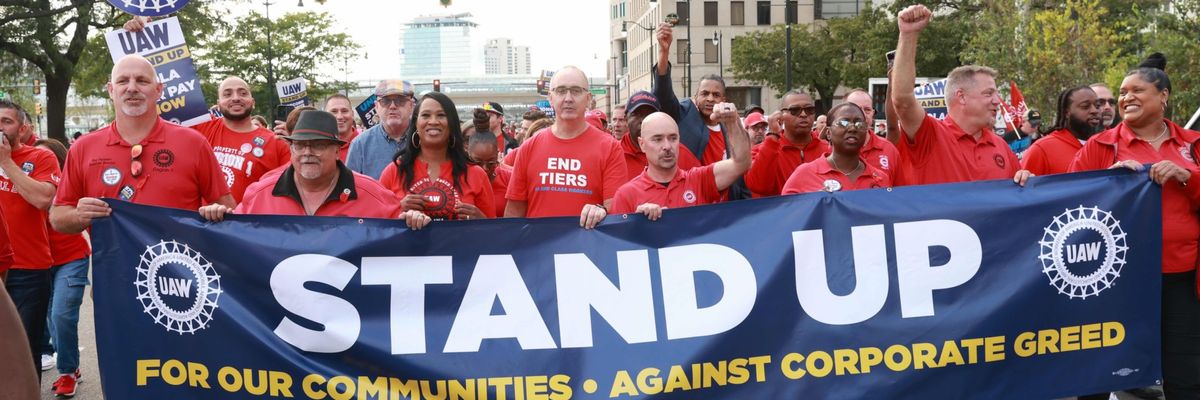The folks at the U.S. Coast Guard know “mayday” as well as anyone. Every year they
handle thousands of “mayday” distress calls. Their counterparts worldwide handle thousands more. Overall, the number of “mayday” calls since the 1920s—when “mayday” became the international go-to for declaring emergency situations—now runs well into the millions.
But we’ve never had a “mayday” more socially consequential than the “mayday” that U.S. auto workers have just thrust upon our global calendar. This potential “mayday” just happens to impact only our world’s richest—and has suddenly become a much more real possibility than a crash of any one of their outrageously deluxe private jets.
What have U.S. auto workers done? They’ve successfully bargained a set of watershed contracts that establish May 1, 2028, as the day the workers of our world may actually unite, for the first time ever, against our world’s super wealthy.
The greatest significance of the new UAW auto industry contracts may be the impact these bargaining triumphs will have on the future. These agreements could become the single most important step to a more equal world that any of us have ever seen.
The new contracts the United Auto Workers union is now signing with Detroit’s Big Three—Ford, GM, and Stellantis—all set April 30, 2028 as their expiration date. That would make May 1 the day the workers the three new contracts cover walk out on strike if no new deal materializes.
This May 1 date, of course, holds enormous global significance. Working people the world over have been celebrating the first of May as “International Labor Day” for generations, in a tradition that began back in 1886 when workers in the United States struggling for an eight-hour day staged a May 1 national protest.
If May 1, 2028, arrives without signed contracts for America’s unionized auto workers, UAW president Shawn Fain has now made plain, these workers don’t plan on walking out alone.
“We invite unions around the country to align your contract expirations with our own so that together we can begin to flex our collective muscles,”
says Fain. “If we’re going to truly take on the billionaire class and rebuild the economy so that it starts to work for the benefit of the many and not the few, then it’s important that we not only strike but that we strike together.”
And by aligning the UAW’s next big contract deadline with International Labor Day, the union is clearly inviting coordination
beyond the national level. The May Day that workers worldwide have so long honored, as Fain notes, has always been “more than just a day of commemoration, it’s a call to action.” And the labor movement worldwide, as the latest headlines remind us, is showing real signs of acting more in strategic concert.
Within the global auto industry, for instance, no corporation more embodies the inequality our corporate world order has spread so aggressively than the non-union Tesla. Under CEO Elon Musk, the world’s richest single individual, Tesla pays wages that run substantially below the hourly rates at Detroit’s Big Three, and that gap will only widen after the new UAW contracts go into full effect.
This shortchanging of workers has sped the growth of Musk’s fabulous fortune and helped boost Tesla’s share of the global electrical vehicle market to about 60%. The new UAW contracts,
predicts German Bender of the Swedish think-tank Arena, could well “boost union interest among Tesla workers.”
That interest already seems to be growing. On the final Friday of the UAW walkout in the United States, workers at Tesla-owned servicing shops in Sweden went out on strike—after five years of fruitless attempts to get Tesla’s Swedish subsidiary to reach a bargaining agreement. That strike has now spread to all auto shops in Sweden that do work on Tesla cars.
This Swedish walkout, the global union confederation IndustriALL has announced,
represents the first formal strike against Tesla anywhere in the world. And the challenge to Tesla may soon be spreading beyond Sweden. Germany’s largest union, Bloomberg reports, is hoping to organize a 12,000-worker Tesla plant near Berlin.
Tesla’s over 120,000 workers worldwide will certainly see plenty to like in the new UAW contracts in the United States. At Ford, workers who started as temps making $16.67 an hour will be automatically moving to permanent status and an hourly wage rate of at least $24.91. That rate
will hit $40.82 an hour by the contract’s end, and any inflation between now and then will kick that rate still higher.
Workers in major American industries haven’t seen gains that stunning since the middle of the 20th century, a time when the chief execs of America’s largest corporations averaged only just over 20 times the compensation of their workers. That gap today, the Economic Policy Institutecalculates, is now running nearly 350 times.
But the greatest significance of the new UAW auto industry contracts may be the impact these bargaining triumphs will have on the future. These agreements could become the single most important step to a more equal world that any of us have ever seen.
The giants of American auto manufacturing, as Fain puts it, “underestimated” their own workers’ capacity to unite and fight together.
“We have shown the companies, the American public, and the whole world that the working class is not done fighting,” he adds. “In fact, we’re just getting started.”

